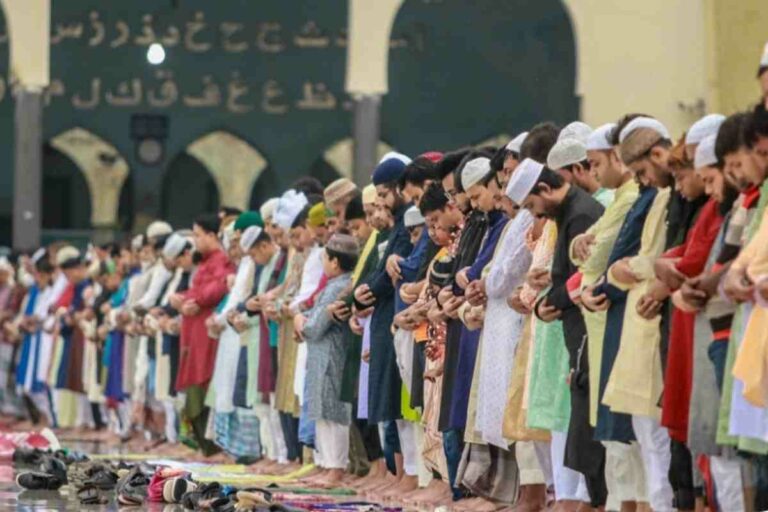On Friday, 5 August 2022, IHRC hosted an author event with Scholar of Islamic Studies, Mukhtar H. Ali to discuss his book Philosophical Sufism: An Introduction to the School of Ibn al-‘Arabi.
The book analyses ‘the intersection between Sufism and philosophy’ and is ‘a sweeping examination of the mystical philosophy of Muhyi-l-Din Ibn al-‘Arabi (d. 637/1240), one of the most influential and original thinkers of the Islamic world.
The event was chaired by Talha Ahsan, host of the Abbasid History Podcast.
WATCH THE FULL EVENT HERE:
The conversation has been edited slightly for better readability.
Mukhtar H. Ali: “The times question of existence forms the basis of every other enquiry. What is the nature of being and how do we come to know it. The starting point is the study being itself before questioning the existence of God, his attributes, creation, the human being, the macrocosm, the microcosm and so on. We must ask what being is in and of itself. It is necessary to examine it. Let us begin for asking the second question first. Pondering the nature of being is not only the work of philosophers, and metaphysicians but intrinsic to every human being. At one time or another all ways to know the meaning of existence and our place within it.”
Talha: Tell us about Ibn Arabi
Mukhtar H. Ali: Ibn Arabi was a great mystic, rather than a philosopher, he was a saint. In Arabic, we call it Arif. While there is a lot of work and study of Ibn Arabi, there is a resurgence of a study of his writings. Simply stated, he was a visionary mystic, a very prolific writer and a very expansive thinker and he was able to document his visionary experiences. Most of what he wrote about were his visions and what he did was he codified that. They were not random visions; we all see visions. We have all had dreams and spiritual experiences. The difference between a systematic thinker, like Ibn Arabi, is that he was able to collect all that material and create a framework, a metaphysical system. That what we have here. Hence, he was amongst the most influential thinkers of Islam.
Talha: You have divided the book into 12 parts, and it is sort of like an ontology. You set a foundation build up to his cosmology, discussing ontology first and then talking about Ibn Arabi’s movement… How from ontology do we get our conceptions of the Divine?
Mukhtar H. Ali: I will first explain the title and hopefully that can at least unleash some of the ideas. It is called philosophical Sufism because Sufism is Islamic mysticism. The Arabic word is arfan. And not all the urafa or the mystics affiliated themselves with the Sufis. The Sufis were a particular group and had a particular legacy. Not every arif is considered a Sufi. So, there is a distinction but because western academia has already set the standards and the terminology, they tend to lump all of the Islamic mysticism in this term Sufism. It is not fair to say that everything we do in mysticism is Sufism. In any case, it is a term that is being used now so I have decided to use it.
Sufism is the mystical interior path. Why is it philosophical? Most Sufis see that reality as ascertained and understood through unveiling, through spiritual experience, through what is known as muqashifa or mushahida (spiritual methods). Where does philosophy come into this? Philosophical methodology is to do with deductive reasoning or the use of reason. It is not an amalgamation of Sufi methodology and philosophical methodology. That is not what’s being done here; it is not a syncretic methodology.
Talha: The Arif & the Sufi are two different things. I don’t think I am alone when I say that kind of distinction. Do you want to help us with that?
Mukhtar H. Ali: This book is a commentary of the first book Qaysari’s introduction to Ibn Al Arabi. It is studied in Iran, in all the seminaries and major centres which focus on theoretical mysticism. Qaysari never once used the word Sufi. But he used the words Arif, Arfan, Ahlal Haqiqa, the people of Truth, the people of reality, the people of God, Ahl-Allah. These are all terms and Sufi is one of the terms that is also used in Islamic culture to describe these people, but not every Arif is a Sufi and vice versa. There are some historical distinctions.
Talha: There is a reality with a capital R and another reality on the grassroots. That is what this book is systemising. Is that correct?
Mukhtar H. Ali: yes, what the Arif is doing or what the Arif desires, is the same thing as the philosopher’s desire. Everyone desires the same thing. We want to know about life, we want to know about reality, what does this world mean? What is it all about? The Arif is the same. And there is no difference; the only difference is the Arif is going a step further using, say, meditative practices and delving into spiritual practises to ascertain truth. The Arif is also trying to establish what reality is. We cannot deny that there is a reality… We cannot know absolute reality because that is God. But we can know something of reality. We can arrive at Haqiqa; the whole first chapter discusses and describes Haq and Haqiqa. Haqiqa is reality. Haq is the truth. Or it can refer to God, Being. And so, these are interchangeable words in this discourse.
Talha and Mukhtar H. Ali discussed questions from the audience about Islam, spirituality, resurrection and philosophy. The event covered different aspects of Islamic spirituality which goes into aspects of Allah’s divine names and Islamic philosophy.







